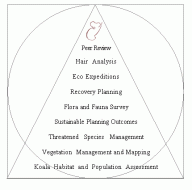![]()
Ecologically Sustainable Development
Now usurped by government inaction on climate change, Ecologically Sustainable Development (ESD) was once considered to be the greatest challenge facing Australia's governments, industry, business and community. The National Strategy for Ecologically Sustainable Development (NSED) was intended to provide both strategy and a framework for governments to direct policy and decision making towards long-term benefits (as opposed to short-term gain) in order to ensure inter-generational equity. While there is no universally accepted definition of ESD, in 1990 the Australian Commonwealth Government proposed the following:
“using, conserving and enhancing the communities resources so that ecological processes on which life depends are maintained, and the total quality of life, now and in the future, can be increased”
Put simply, ESD is development which aims to meet the needs of Australians today, while conserving ecosystems for the benefit of future generations. To do this, our society needs to develop ways of using those environmental resources which form the basis of our economy in a way which maintains, and where possible, improves their range, variety and quality.
Core objectives of the NSED are:
- to enhance individual and community well-being and welfare by following a path of economic development that safeguards the welfare of future generations,
- to provide for equity within and between generations, and
- to protect biological diversity and maintain essential ecological processes and life-support systems.
Given our current circumstance, there is clearly a big difference between "talking the talk" and "walking the walk". Despite the fact that nearly 20 years have passed since the NSED was endorsed, there is little evidence that society is actually embracing the need to do anything about it....
Graham Pizzey - Journey of a Lifetime"But we fool ourselves. We can land men on the moon and we can send probes into deep space to look for extra terrestrial life while our growth economies and flawed agricultural systems increasingly devastate the earth. Sooner or later we will accept, as some are learning now, that we are living a great paradox. We will learn that planet earth is where we will find our salvation, that planet earth is where we will find heaven, if we show wisdom.
So long as we work with Earth's living processes, enhancing and assisting them within the light of our fundamental biological and molecular research, we may have a slim chance to make our woodlands whole again, renew our depleted forests, clean our rivers and restrain global warming, ultra-violet radiation and rising sea levels.
But these things won't happen until there is far wider respect for the integrity of the earth, forests, seas and all their natural processes. It won't happen until we learn that the best legacy we can leave our children and their children are diverse, healthy, natural ecosystems."
So how do we go about the process of living more sustainably? Quite simply, it comes down to matters of choice: what we eat, who we vote for and what we teach our children (and each other) to name just a few. The point here is that the positive choices we make either as individuals, organisations or communities can be small or they can be large, but they always make a difference. So make your choices wisely and commit to them with the best interests of our planet's future in mind. Below are some examples of organisations already committed to helping us change:
- Enova Community Energy www.enovaenergy.com.au
- The Environmental Defender's Office www.edo.org.au
- The Change Agency www.thechangeagency.org
- Australian Earth Laws Alliance www.earthlaws.org.au
- The Centre for Education & Research in Environmental Strategies (CERES) www.ceres.org.au
Remember not to follow but always lead, and that the choice is yours...
"...when our willpower is concentrated upon a stone, it can pass through it. When our willpower is focused and in harmony with the universe it can command the wind, rain and thunder.
But from where does our willpower come? Those who understand and answer this question are those who accomplish important tasks.
When we coordinate mind and body by stilling the waves of our mind to imperceptible, infinitely decreasing ripples, we can send forth our great willpower that moves the universe."
Koichi Tohei (1920 - 2011)



